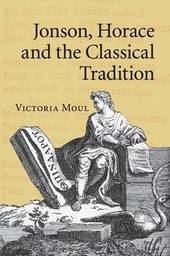
|
Jonson, Horace and the Classical Tradition
Paperback / softback
Main Details
| Title |
Jonson, Horace and the Classical Tradition
|
| Authors and Contributors |
By (author) Victoria Moul
|
| Physical Properties |
| Format:Paperback / softback | | Pages:260 | | Dimensions(mm): Height 230,Width 155 |
|
| Category/Genre | Literary studies - c 1500 to c 1800
Literary studies - plays and playwrights |
|---|
| ISBN/Barcode |
9781316501641
|
| Classifications | Dewey:822.3 |
|---|
| Audience | | Professional & Vocational | |
|---|
| Illustrations |
Worked examples or Exercises; Printed music items
|
|
Publishing Details |
| Publisher |
Cambridge University Press
|
| Imprint |
Cambridge University Press
|
| Publication Date |
28 April 2016 |
| Publication Country |
United Kingdom
|
Description
The influence of the Roman poet Horace on Ben Jonson has often been acknowledged, but never fully explored. Discussing Jonson's Horatianism in detail, this study also places Jonson's densely intertextual relationship with Horace's Latin text within the broader context of his complex negotiations with a range of other 'rivals' to the Horatian model including Pindar, Seneca, Juvenal and Martial. The new reading of Jonson's classicism that emerges is one founded not upon static imitation, but rather a lively dialogue between competing models - an allusive mode that extends into the seventeenth-century reception of Jonson himself as a latter-day 'Horace'. In the course of this analysis, the book provides fresh readings of many of Jonson's best-known poems - including 'Inviting a Friend to Dinner' and 'To Penshurst' - as well as a new perspective on many lesser-known pieces, and a range of unpublished manuscript material.
Author Biography
Victoria Moul is a lecturer in Latin language and literature at King's College London. She works on various aspects of the interpretation of classical poetry in both ancient and more modern literature.
Reviews'Moul's book is an important contribution to Jonson studies, revealing how Jonson constructed his own authorial identity by creatively exploiting and combining a wealth of classical contexts.' Translation and Literature
|